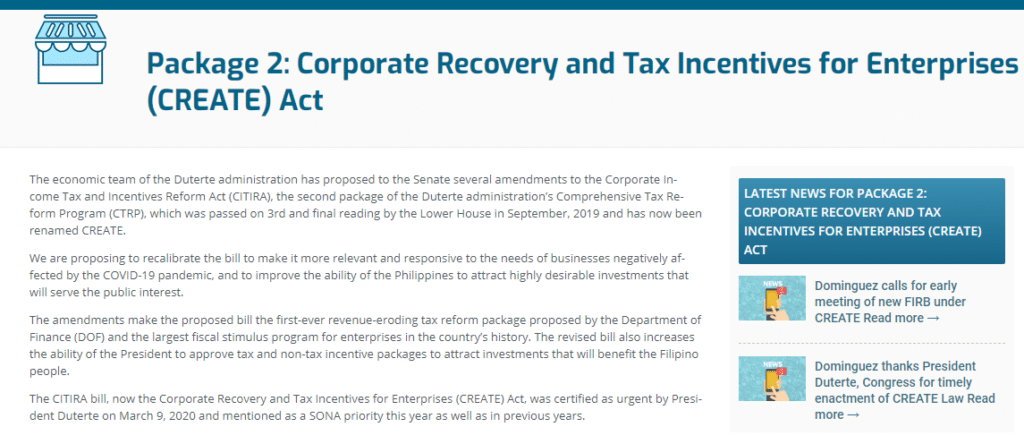The income tax rate of corporations lowered in the Philippines
The CREATE law has lowered corporate income taxes in the Philippines.
The article below discusses the corporate taxes that were affected:
• Corporate tax rates
• Minimum Corporate Income Taxes (MCIT)
• Improperly Accumulated Earnings Tax (IAET) on the corporation’s retained earnings
• VAT exceptions for some kinds of goods
We go into detail below and can also discuss this when you contact us.
Corporate income tax lowered in the Philippines

A Domestic Corporation is subject to income tax on its worldwide income. A Foreign Corporation is only subject to income tax on income from Philippine sources.
The Philippine corporate income tax rate, previously set at 30%, has been lowered by the passage of amendments to the national tax code. That 30% rate, which was on the high end for the ASEAN region, has been lowered to 20% for micro, small, and medium enterprises (MSMEs) and to 25% for other corporate taxpayers.
The new law is also meant to plug tax leakages through the rationalization of the fiscal incentives granted to investors, and shifts the administration of these incentives to a performance-based, targeted, time-bound, and transparent system.
Republic Act No. 11534, the Corporate Recovery and Tax Incentives for Enterprises Act (CREATE) was signed into law on March 26, 2021, but has favorable retroactive provisions which effective as of July 1, 2020. The CREATE law amends extensive portions of the National Internal Revenue Code of 1997.
The new corporate income tax rates to be computed as of July 1, 2020 are:
20% for Domestic Corporations with net taxable income not more than P5 million and total assets not more than P100 million (excluding land on which the business entity’s office, plant, and equipment are located).
25% for all other Domestic Corporations and Resident Foreign Corporations.
MCIT also lowered

Minimum Corporate Income Tax (MCIT) rate is lowered
The CREATE law also reduces the Minimum Corporate Income Tax (MCIT) rate from 2% to 1% of gross income for the period of July 1, 2020 up to June 30, 2023 for all Domestic Corporations and Resident Foreign Corporations.
The MCIT is an income tax imposed on Domestic or Resident Foreign Corporation beginning on the 4th taxable year from commencement of operations. As an income tax, the MCIT is imposed in lieu of the normal income tax when the computed corporate income tax rate of 30% (now amended to 20% or 25%) is lower than the MCIT. The MCIT is imposed only on the 4th year of operation in accommodation of early struggles that newly launched businesses can expect to have. Its reduction to 1% is partly in consideration of the even more challenging environment brought about by the pandemic.

Some provisions in the CREATE Act can help minimize the impact of the pandemic to the business sector
The CREATE law has been long in the making. Proposals along its lines were filed as early as 1999. The effects of the COVID pandemic provided an impetus to its finally being passed. Although long in development and with a longer view in mind, a number of its provisions are intended as relief for corporations in the face of the ongoing pandemic.
Thus, the corporate income taxes of proprietary educational institutions and hospitals which are nonprofit are also reduced from 10% to 1% for the period of July 1, 2021 to June 30, 2023. This is intended to help schools and hospitals, crucial to the country’s post-COVID-19 recovery. Note though, that if the gross income from unrelated trade, business or other activity of these schools or hospitals exceeds 50% of the total gross income derived by such educational institutions or hospitals from all sources, then the tax prescribed for domestic corporations shall be imposed on the entire taxable income.
IAET repealed

Improperly Accumulated Earnings Tax (IAET) is removed
The CREATE Act has also repealed the Improperly Accumulated Earnings Tax (IAET) on a corporation’s retained earnings, previously set at 10% of what were considered improperly accumulated retained earnings. The IAET penalized the retention of what it considered earnings retained beyond the reasonable needs of the business in avoidance of income taxes on dividends. The IAET is no longer imposed. (Note though that the IAET was not imposed on publicly-held companies, banks and other non-bank financial intermediaries, and insurance companies.)
VAT exemptions under the CREATE Act

CREATE, COVID, & VAT
Partly with a view to the COVID pandemic, the sale and importation of certain prescription drugs and medicines are now exempt from the Value Added Tax. Vaccines and medicine for the treatment of COVID, as well as medicine for the treatment of cancer, mental illness, tuberculosis, and kidney diseases are now VAT exempt. Personal protective equipment (PPE) is similarly exempt. The CREATE Act now also exempts books, newspapers, magazines, journals, and the like from VAT.
The CREATE Act is designed to develop the national economy toward global competitiveness through policies that attract multinational investment. It puts in place a tax regime meant to be performance-based, targeted, time-bound, and transparent. It provides support to businesses in their recovery from the global pandemic and is intended to strengthen the nation for similar crises in the future. Its tax incentive system is designed to allow for inclusive growth, job generation, and opportunities in all the regions of the country, thus it further incentivizes investment in the countryside.






0 Comments